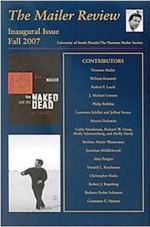Mailer review puts spotlight on USF professors

The thing that really characterizes Norman Mailer’s work, said Raymond Vince, a professor of English, is the difficulty people encounter when they try to characterize it.
Vince is the associate editor and one of three faculty members at USF who worked on the Mailer Review, a literary journal devoted to the American author, who died in November.
Until Mailer’s death, in fact, the Review had the distinction of being devoted to a living author, making it, according to the New York Times’ Literary Supplement, very exceptional.
Editor Philip Sipiora could think of only one other such journal, dedicated to the works of Philip Roth, but did not think the author’s passing would greatly affect the Review or how his work was examined.
The Review is co-sponsored by the English department and the Norman Mailer Society, a group devoted to his life and works.
The first issue, published in October 2007, is a mix of literary review, biographical essays, letters, artwork and notes, among other things. Items such as an essay by Mailer’s sister, Barbara Mailer Wasserman, describing some of her experiences growing up with him reflect the variety inspired by an author whose own work was variegated.
He often chose controversial figures to write about, Sipiora said. “He was fearless in his personification of major figures, such as Hitler, Marilyn Monroe, and Christ.”
“He reflected our times at many different points-in the ’60s, the ’70s and the ’80s-he had his thumb on the pulse of things,” said Constance Holmes, an associate editor and contributor.
Vince said of Mailer’s work: “He was very much an American writer, who often piled up language and used powerful metaphors.
The Review will be nominated for “Best New Journal” in the nation upon completion of the second issue, which they expect will be in August this year, Siporia said. The distinction is awarded by the Council of Editors of Learned Journals to one journal every year and will be a boon to USF’s reputation, he said. Regardless of the outcome, though, the Review, along with “many other fine journals,” is “another step in USF moving toward that tier of well-respected and first-ranked universities.”
Sipiora, whose work as editor includes dealing with correspondents, reviewing manuscripts, advertising the Review and examining copyright permission, says the sometimes overwhelming amount of work he and his peers put into the journal is justified by an enduring passion for the author’s work.
“We’re doing this because we believe very strongly in it,” he said.






